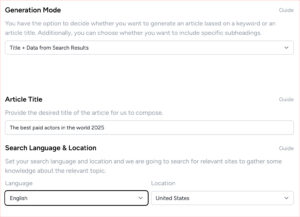Recently, the strategy of utilising semantic clusters has emerged as a game-changer in SEO. Semantic clusters involve grouping related keywords that cover a specific topic or theme, ensuring that content isn’t just about using the right keywords, but about creating a rich, interconnected web of relevance that search engines can’t help but notice.
This approach not only boosts a website’s visibility but also improves user engagement by providing comprehensive coverage of a subject.
In this article, we’ll look at how semantic clusters can significantly enhance your SEO efforts, ensuring that your content is both discoverable and impactful.
Here’s what we’ll cover:
- What Are Semantic Clusters?: Definition and importance in SEO.
- Benefits of Using Semantic Clusters: How they improve search rankings and user experience.
- Implementing Semantic Clusters: Practical steps for creating and optimizing semantic clusters.
- Examples and Case Studies: Real-world applications and success stories.
By the end of this post, you’ll understand how to effectively use semantic clusters to enhance your SEO strategy.
Understanding Semantic Clusters
Semantic clusters significantly boost your SEO strategy by grouping related keywords and topics to enhance content relevance. When you create content around these clusters, you’re not just focusing on single keywords. Instead, you’re considering a spectrum of related terms that surround your main topic.
So, when you’re planning your content, think beyond keywords. Focus on building thematic groups that provide comprehensive information on specific subjects, thereby improving your site’s architecture and user experience.
Relevance to Search Intent
Understanding search intent is crucial as it aligns your content with what users are actually seeking. When you tap into the right intent, you’re not just throwing words into the void; you’re connecting with your audience on a level that truly resonates.
Semantic clusters help you achieve this by organising related topics and keywords that mirror the user’s journey. By focusing on these clusters, you ensure your content addresses the specific needs, questions, or problems your audience has.
This isn’t just about ranking higher; it’s about being the right answer at the right time. So, dive deep into understanding the different types of search intents—informational, navigational, transactional, and commercial. Tailoring your content to these can dramatically increase your relevance and engagement.
Improving Site Architecture
Improving your site’s architecture not only enhances user experience but also boosts your SEO effectiveness. By organising your content into semantic clusters, you’re streamlining navigation and making it easier for search engines to crawl and index your pages. This setup allows you to target broader topics and related keywords more effectively and strengthens your site’s authority and relevance in your niche.
Think of your website as a library. Just as books are grouped by genres and topics, your site should cluster related content. This doesn’t just help users find information faster; it also signals to search engines that you’re an authority on those topics.
Implementing a logical, hierarchical structure with clear internal linking ensures visitors spend more time on your site, reducing bounce rates and increasing the chances of conversion. By organising content thematically, you’ll find that users can intuitively explore related topics without getting lost or frustrated.
For you, this means that when users search for information, they’re more likely to find exactly what they need on your site. They won’t have to click back and forth between pages as often, creating a smoother and more enjoyable browsing experience. This strategic arrangement helps in guiding them through your content, keeping them engaged and interested in what you have to offer.
Building Authority and Trust
By implementing semantic clusters, you’re also building authority and trust with your audience. This strategy positions you as a knowledgeable source in your field. When your content deeply covers connected topics, users see you as reliable, boosting their confidence in your expertise. This trust translates into increased engagement, with visitors more likely to return, share your content and recommend your site.
Consistently delivering thorough, interconnected content also signals to search engines that you’re a subject matter expert. Over time, this not only improves your rankings but ensures that your site is recognised as an authoritative source. This recognition further solidifies user trust and fosters a loyal audience base.
Measuring Success with Analytics
To gauge the effectiveness of your semantic clusters, you’ll need to closely monitor relevant metrics through analytics tools. Start by tracking your site’s organic traffic growth. Are more visitors coming from search engines since you’ve implemented these clusters?
Next, examine keyword rankings. You’re aiming for higher rankings for a broad set of related keywords, not just a few.
Also, don’t overlook user engagement metrics such as bounce rate, pages per session and average session duration. Improved clustering should lead to better content relevance, which typically enhances user engagement.
Finally, assess the conversion rates. Are more visitors completing desired actions? This direct correlation between SEO efforts and conversions can definitively show the impact of your semantic clustering strategy.
Can semantic clusters improve the user experience on a website, and if so, how?
Semantic clusters can greatly enhance user experience on your website by providing a more comprehensive and organised content structure.
They allow users to easily navigate related topics, find relevant information, and spend more time engaging with your site.
Are there specific tools or software recommended for identifying and building semantic clusters effectively?
To identify and build semantic clusters effectively, consider tools like SEMrush, Ahrefs, and Clearscope. These resources provide insights to streamline your SEO strategy.
Utilise them for comprehensive keyword research and content optimisation.
Conclusion
In conclusion, leveraging semantic clusters in SEO can significantly boost your website’s visibility and ranking. By organising related keywords into clusters, you can create a more cohesive and comprehensive content strategy that resonates with search engines and users alike.
This strategic approach enhances your website’s relevance and authority in your niche, ultimately driving more organic traffic and improving your overall online presence.
For more reading, check out our Ultimate Guide to Semantic SEO.





